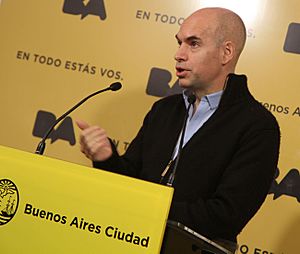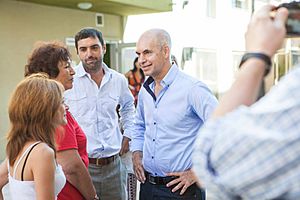Horacio Rodríguez Larreta facts for kids
Quick facts for kids
Horacio Rodríguez-Larreta
|
|
|---|---|
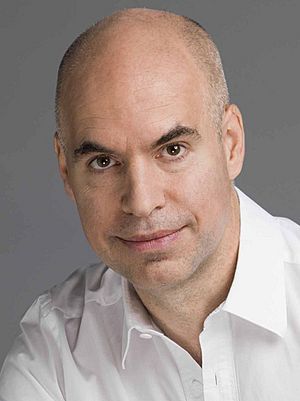
Rodríguez-Larreta in 2012
|
|
| 6th Chief of Government of Buenos Aires | |
| In office 10 December 2015 – 7 December 2023 |
|
| Deputy | Diego Santilli |
| Preceded by | Mauricio Macri |
| Succeeded by | Jorge Macri |
| Chief of the Cabinet of Ministers of Buenos Aires | |
| In office 10 December 2007 – 10 December 2015 |
|
| Mayor | Mauricio Macri |
| Preceded by | Raúl Fernández |
| Succeeded by | Felipe Miguel |
| Personal details | |
| Born | 29 October 1965 Buenos Aires, Argentina |
| Political party |
|
| Other political affiliations |
Juntos por el Cambio (since 2015) |
| Spouse |
Bárbara Díez de Tejada
(m. 2001; separated 2020) |
| Children | 2 |
| Residences | Buenos Aires, Argentina |
| Education | |
| Occupation |
|
| Signature | |
Horacio Rodríguez-Larreta (born October 29, 1965) is an Argentine economist and politician. He served as the Chief of Government of Buenos Aires, which is a role similar to a mayor. He held this position from 2015 to 2023.
In 2019, he was re-elected with nearly 56% of the vote. This was a big achievement because he was the first candidate to win the election in the first round, without needing a second vote. He was popular in almost every neighborhood, or comuna, of the city.
After his time as mayor, he became a key leader in the Juntos por el Cambio political group. In 2023, he ran for President of Argentina. He competed against another member of his party, Patricia Bullrich, but she won the primary election to become the party's main candidate.
Contents
Early Life and Schooling
Horacio Rodríguez-Larreta was born in Buenos Aires, Argentina. His family has a long history in the country. His father's side of the family came from the Basque region of Spain and was very wealthy. His father, also named Horacio, was a leader in politics and was the chairman of the famous soccer team, Racing Club.
Rodríguez-Larreta is also related to other important families in Argentina's history. He went to the Escuela Argentina Modelo for high school. Later, he studied economics at the University of Buenos Aires and graduated in 1988. He then earned a Master's degree from Harvard Business School in the United States. He returned to Argentina in 1993 to start his career.
Beginning His Political Career
Rodríguez-Larreta started his work in government in 1995. He worked for the national agency in charge of social security, which helps people with retirement and other benefits. He later worked for the Ministry of Social Development.
In 2000, he was put in charge of PAMI, a health care program for older citizens. He is known for helping to improve the program's finances by carefully managing its budget.
Working with Mauricio Macri
He helped his friend Mauricio Macri create a new political party called Republican Proposal (PRO). When Macri was elected Mayor of Buenos Aires, Rodríguez-Larreta became his Chief of the Cabinet of Ministers. He worked in this important role for eight years, helping Macri run the city.
In 2015, Rodríguez-Larreta decided to run for mayor himself. He competed against another member of his party, Gabriela Michetti, and won his party's support. In the main election, he faced Martín Lousteau. Rodríguez-Larreta won the final vote and became the new Mayor of Buenos Aires, taking over from Macri.
Chief of Government of Buenos Aires
While Rodríguez-Larreta was mayor of Buenos Aires, his friend and colleague Mauricio Macri was elected President of Argentina in 2015. They were both from the same political party, PRO.
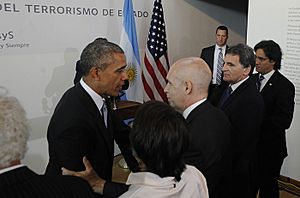
City Security
One of the first things Rodríguez-Larreta did was to create the Buenos Aires City Police. This new police force combined officers from the federal police and the city's own police. This gave the city more control over its own security. With this new force, his government worked to make busy shopping areas like the Caballito and Once neighborhoods safer.
Major City Projects
Rodríguez-Larreta's time as mayor is known for many large construction projects that changed the city.
Transportation Improvements
- Paseo del Bajo: This is a 7.1-kilometer road that connects two major highways. It was built to help traffic, especially trucks and buses, move through the city much faster. It also created new parks and green spaces for people to enjoy.
- Mitre Viaduct: This project raised a major train line, the Mitre line, above the streets. This got rid of dangerous street-level train crossings, making traffic safer and faster. It also allowed new streets to be opened.
- Subway Expansion: His government opened new stations for the city's subway system, known as the Subte. A new station was added to Line H near the University of Buenos Aires law school. Three new stations were also opened for Line E, connecting it to a major transportation hub.
Other City Works
During his time as mayor, the city also built new schools, thousands of new homes, and new health centers. The city's streetlights were all updated to modern LED lights. In 2018, Buenos Aires hosted the 2018 Summer Youth Olympics, and his government built the Olympic Village for the athletes.
Winning Re-election
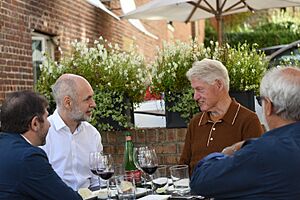
In 2019, Rodríguez-Larreta was re-elected as mayor with a large majority of the vote. He was so popular that he won in the first round of voting, which is rare in Buenos Aires politics. He won in almost every neighborhood of the city.
Personal Life
Rodríguez-Larreta was married to Bárbara Díez de Tejada from 2001 to 2020. They have two daughters together. In 2022, he announced his relationship with Milagros Maylin, who also worked in the city government.
He is a Roman Catholic. He also has a condition called essential tremor, which can cause his hands to shake. It is a common condition that affects the nervous system.
Electoral History
This section shows the results of the elections Horacio Rodríguez-Larreta has participated in.
Executive Office (Mayor and President)
| Election | Office | List | Votes | Result | Ref. | |||
|---|---|---|---|---|---|---|---|---|
| Total | % | P. | ||||||
| 2003 1-R | Deputy Chief of Government of Buenos Aires | Commitment to Change | 660,748 | 37.79% | 2nd | → Round 2 | ||
| 2003 2-R | Commitment to Change | 807,385 | 46.52% | 2nd | Not elected | |||
| 2015 1-R | Chief of Government of Buenos Aires | Republican Proposal | 832,619 | 45.56% | 1st | → Round 2 | ||
| 2015 2-R | Republican Proposal | 861,380 | 51.64% | 1st | Elected | |||
| 2019 | Juntos por el Cambio | 1,095,013 | 55.90% | 1st | Elected | |||
| 2023 PASO | President of Argentina | Juntos por el Cambio | 2,675,563 | 11.30% | 4th | Not elected | ||
Legislative Office (City Lawmaker)
| Election | Office | List | # | District | Votes | Result | Ref. | |||
|---|---|---|---|---|---|---|---|---|---|---|
| Total | % | P. | ||||||||
| 2025 | City Legislator | Let's Come Back Buenos Aires | 1 | City of Buenos Aires | 132,788 | 8.08% | 4th | Elected | ||
Images for kids
-
Rodríguez-Larreta with then-mayor Mauricio Macri on a 200 Series train.
See also
 In Spanish: Horacio Rodríguez Larreta para niños
In Spanish: Horacio Rodríguez Larreta para niños
 | Kyle Baker |
 | Joseph Yoakum |
 | Laura Wheeler Waring |
 | Henry Ossawa Tanner |


